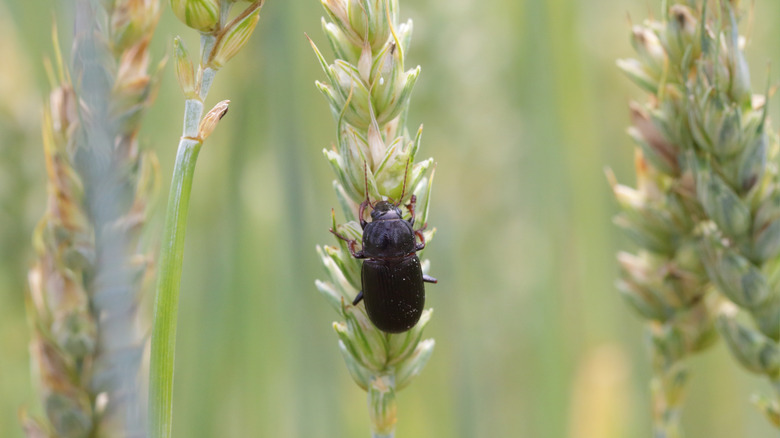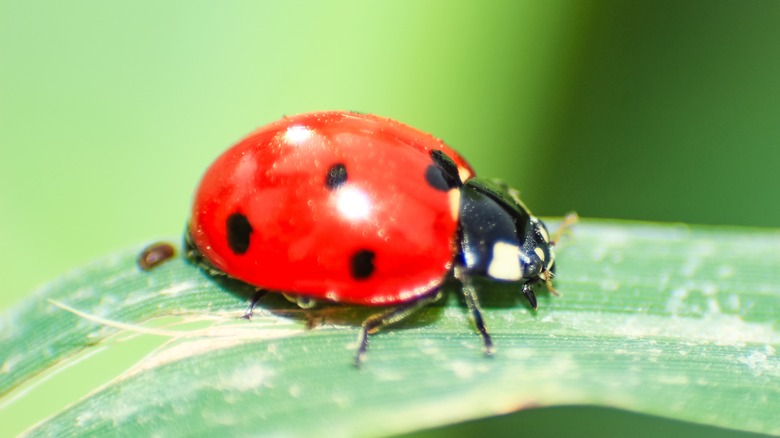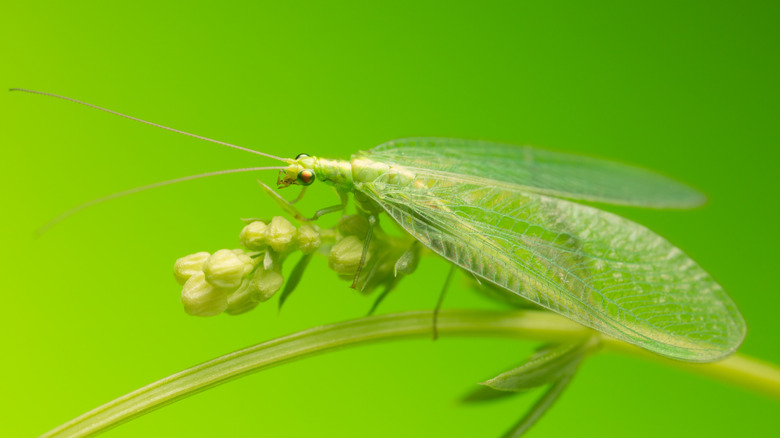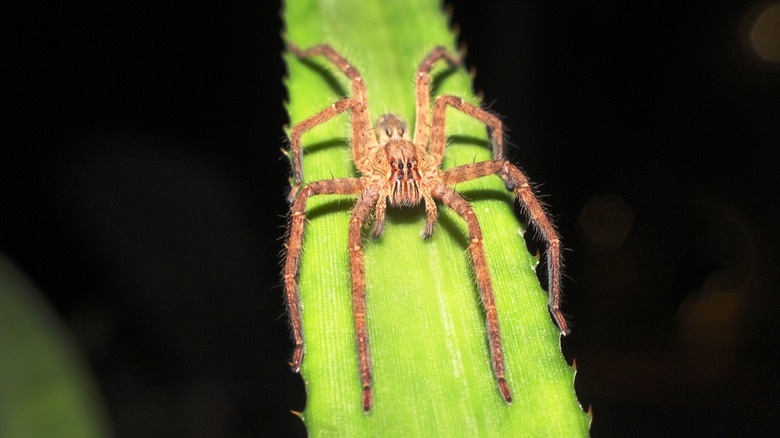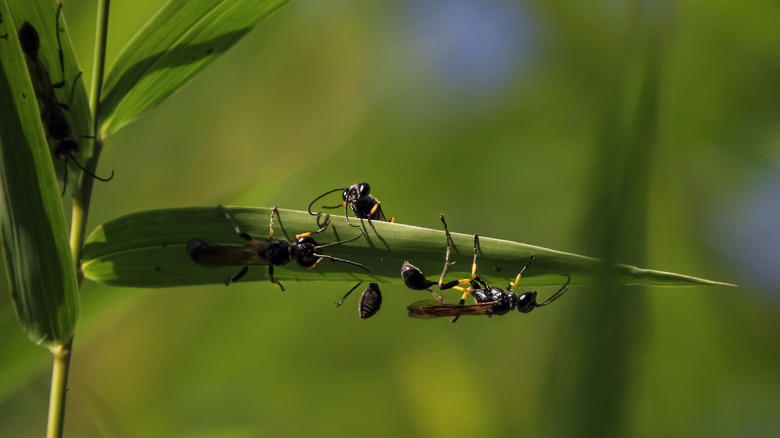The Best Bugs For Protecting Your Garden, According To An Expert
There are a whole host of beneficial bugs and good insects that you can introduce into your garden to help manage potential infestations from pests and other not-so-helpful insects. In an exclusive interview with House Digest, Dr. Charles van Rees, a professional naturalist and conservation biologist who blogs about outdoor science at Gulo in Nature, advises on some of the most effective insect additions that you can bring into your garden to protect the natural habitat and allow plant and animal species to continue to beautify your space. Dr. van Rees notes, "The best insect and invertebrate allies in a garden are typically predators or parasitoids. Both of these groups of animals are extremely effective at finding and eliminating pest species, many of which are plant-eaters."
Predators do a fantastic job of defending trees, flowers, and other plants that you are trying to cultivate at home. Penn State Extension notes that these types of insects eat others that would otherwise prey on your garden plants.
Dr. van Rees continues, saying, "Although non-native species of many of these groups are readily available for purchase, it is much better for your garden to focus on encouraging native species. Native species will be more robust to changes in your garden and provide much more reliable and effective pest control over the long term."
Ground beetles (Carabidae)
The name of the game when introducing beneficial insects into your garden is efficiency and targeted results. As noted, native insects are far more effective at pest control than those imported from a far-flung region, even one based nearby but dominated by a different localized species. Dr. Charles van Rees suggests starting with ground beetles, saying, "Ground beetles have a huge diversity of species and sizes, but all of them are excellent and effective ground-based predators. They are harmless to children or pets, but eliminate caterpillars, maggots, ants, slugs, and many potential ground-based pests."
The fact that a local population of beetles can be found virtually anywhere gives you a great option to introduce a native species into your garden to help control a variety of different pests. Also, because they won't harm children or pets while performing their duty, they act as a silent yet highly potent protective barrier when an aphid or slug problem is identified. Beetles are a fantastic jumping-off point to begin your journey into adding good bugs that can stabilize your garden's ecosystem in a positive way.
Ladybugs
It's well known that aphids are a menace to healthy gardens. "Aphids are tiny, plant-sucking garden pests that can reproduce rapidly (even without mating!) and have severe impacts on plants," explains Dr. Charles van Rees. They attack healthy plant foliage in order to extract plant sap along stems and leaves, quickly form into clumped colonies, and the byproduct of their feeding — known as honeydew — can collect along plant material. Ladybugs can turn the tide against aphids, though, "As both adults and larvae, native ladybugs are voracious predators of aphids," notes Dr. van Rees. "Ladybugs can decimate their numbers and really put a dent in their impact on plants."
Ladybugs are found in abundance all over the United States, meaning that you might be able to attract the local population with a few critical planting additions to your existing garden. The Oregon State University Extension Service notes that crimson clover, yarrow, wild buckwheat, and other flowering plants make for natural habitats that ladybugs flock to.
Lacewings
Lacewings are another highly beneficial addition to any garden. Their bodies are long, and they include a set of intricate and translucent wings. At first glance, a lacewing might appear as an elongated aphid, but Dr. Charles van Rees notes that "Lacewing larvae are adorable, tiny, and super effective predators of aphids, just like ladybugs."
Dr. van Rees continues, "Unlike ladybugs, many lacewing babies are also able to 'disguise' themselves with plant matter, dead aphids, and other flotsam to avoid detection by ants who may be protecting the aphids like livestock. Where ants are making aphids hard to deal with, undercover lacewing babies can make a big difference."
Lacewings are found as a native species in many areas of the country — in the same way that local beetle and ladybug populations are found in abundance — so attracting a population to help in your pest control efforts is a simple matter as well.
Wolf Spiders (lycosidae)
Wolf spiders are ground-based assassins that help with harmful insect species in your garden. Wolf spiders are highly effective, and their nesting habits set them apart from the traditional image that people have of spiders. Dr. Charles van Rees explains, "These spiders don't bother with building webs, but instead run around like little tigers gobbling up harmful pests in your garden. Much like ground beetles, they are an effective line of defense against terrestrial pests. Wolf spiders are also super-moms; females may carry around hundreds of babies on their backs to protect them as they grow."
This means that a small population of wolf spiders in your landscape can make a massive impact when it comes to reducing the prevalence of unwanted pests like grasshoppers, ants, and even the eggs of nesting insects that would eventually grow into larger pest populations down the road. Spiders may not be high on the list for some homeowners looking to introduce new and beneficial animals into their lawn, but the solitary nature of this species and the fact that they don't spin webs will keep them out of sight and out of your way, allowing you to carry on with your daily habits and the wolf spiders to do what they do best: Eviscerate antagonistic insects in your garden.
Wasps
Wasps are the final addition to this list, as noted by Dr. Charles van Rees who explains, "Gardens can support a huge variety of wasps, and the more the better. Although yellowjackets can be pretty aggressive and more likely to sting, most non-social wasps (that is, ones that don't build colonies) just want to be left alone, and aren't particularly likely to sting unless you're careless or aggressive with them."
Unlike wolf spiders and beetles, Dr. van Rees explains, "Many wasps are avid airborne hunters, plucking pests off the leaves and stems of your garden plants. Others are parasitoids: like something out of the movie "Alien," they put their eggs inside of pests' bodies so that their young can eat them from the inside out! These two functions make them really effective pest control." Both forms of predatory behavior are essential to weeding out harder-to-reach insects that ground dwellers can't effectively manage. Wasps come in as a much-needed aerial attacker in this regard.
As with any endeavor to improve your garden's overall health and the micro-environment of your individual property as a whole, a varied approach is often the best option. Cultivating a garden with an abundance of flying and ground-based insects (and those that utilize both methods of hunting their insect prey) will make for the most effective plant protection available to you and your home.

